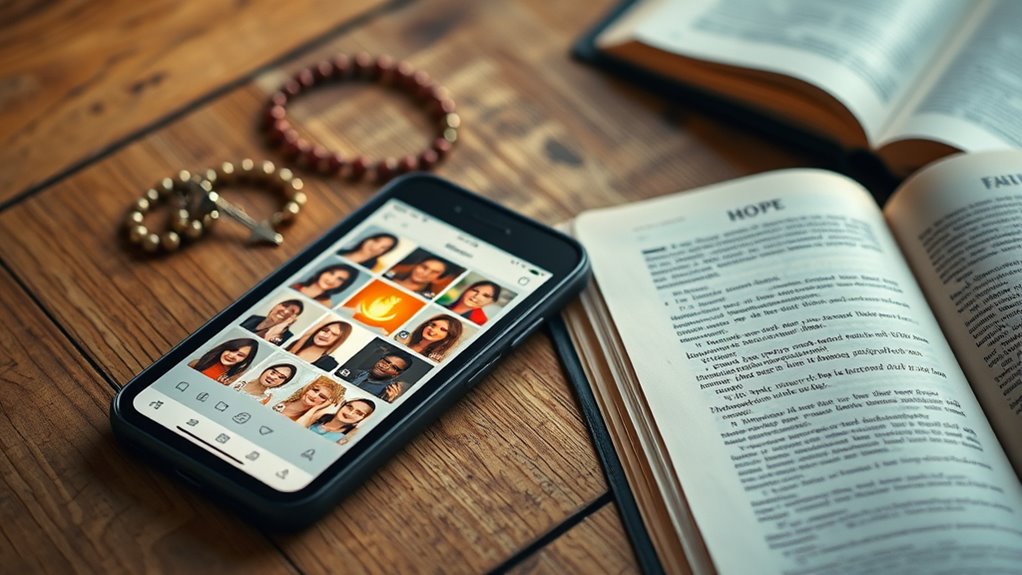Using faith-focused dating apps with filters helps you connect with people who share your beliefs and spiritual values. These platforms let you specify your faith or denomination and create detailed profiles that showcase your beliefs and religious practices. By filtering matches based on shared convictions, you increase the chances of finding a compatible partner committed to similar spiritual goals. Keep exploring to discover how these tools can help you find meaningful, faith-centered connections.
Key Takeaways
- Faith-based dating apps allow users to specify religious beliefs and denominations to match with compatible partners.
- Profile details include spiritual practices, prayer habits, and religious involvement to assess shared values.
- Filtering tools help narrow matches based on faith levels, ensuring greater spiritual compatibility.
- Conversations often focus on faith, family, and church activities, fostering deeper spiritual connections.
- These platforms promote relationships rooted in shared beliefs, supporting mutual spiritual growth and understanding.

Finding a partner who shares your beliefs can feel challenging, but dating apps now make it easier to connect with like-minded individuals. Many platforms emphasize faith-based matchmaking, allowing you to filter potential matches based on shared spiritual values. This focus helps you avoid wasting time on connections that don’t align with your beliefs and increases your chances of finding someone truly compatible. When searching for a partner, you can specify your faith or denomination, ensuring that the people you see are already aligned with your spiritual outlook. This feature is especially valuable if your faith plays a central role in your life, as it weeds out those who might not prioritize religion the same way you do.
Faith-based dating apps help you find compatible partners by filtering matches according to shared spiritual values and beliefs.
Using these apps, you gain access to a community of people who actively seek spiritual compatibility. Instead of relying on chance encounters or vague interests, you can engage with individuals who explicitly express their faith and intentions. These platforms often include detailed profiles where you can share your beliefs, prayer habits, religious activities, and goals for a faith-centered relationship. This transparency helps establish a foundation of shared values right from the start, reducing misunderstandings and aligning expectations early on. Additionally, understanding the importance of faith in daily life can help you better evaluate potential matches and their commitment to spiritual growth.
Another advantage of faith-based matchmaking is the opportunity to explore your spirituality more deeply through your interactions. Conversations can naturally revolve around faith, family, church involvement, and spiritual growth, creating a meaningful connection based on shared convictions. This focus can foster a sense of understanding and mutual support that’s harder to find in more secular settings. As you navigate these apps, you might also find resources and community groups that reinforce your beliefs and help you stay connected with your faith journey.
It’s important to remember that spiritual compatibility isn’t just about shared beliefs but also about how those beliefs influence daily life and relationship goals. Faith-based matchmaking allows you to see how potential partners live out their faith, whether through service, prayer, or community involvement. This insight helps you determine if your spiritual paths are truly aligned, setting the stage for a relationship built on trust and shared purpose.
Ultimately, these apps empower you to prioritize faith in your search for love, making it easier to find someone who not only shares your beliefs but also respects and supports your spiritual growth. By leveraging faith-based matchmaking tools, you’re more likely to build a relationship grounded in spiritual compatibility, fostering a connection that’s both meaningful and enduring.
Frequently Asked Questions
Can I Filter Matches by Specific Religious Denominations?
You can absolutely filter matches by specific religious denominations. Many dating apps offer denomination filters that let you set your religious preferences precisely. This feature helps you find people who share your beliefs and values, making your search more targeted. By using these filters, you increase your chances of connecting with someone compatible on a deeper level, ensuring your matches align with your religious outlook and personal faith journey.
How Do I Verify the Authenticity of Someone’S Faith Claims?
To verify faith authenticity, start by asking open-ended questions about their beliefs and experiences. Pay attention to consistency in their responses, which can indicate honesty. Share your own beliefs to foster trust and encourage openness. You can also suggest meeting in person or engaging in shared religious activities, as these help with trust verification. Remember, genuine faith often shows through actions, so observe how they live their beliefs daily.
Are There Apps Dedicated Solely to Faith-Based Dating?
Sure, there are apps dedicated solely to faith-based dating, where you’d think everyone’s sincere about shared beliefs. Ironically, even on these platforms, secular dating considerations sneak in, making interfaith conversations inevitable. These apps cater to specific faith communities, helping you find someone who aligns with your values. While they focus on faith, remember that genuine connection still depends on open dialogue, not just a shared profile.
How Do I Approach Faith Topics on a Dating Profile?
When approaching faith topics on your profile, be honest about your beliefs and values. Share how your faith influences your life and relationships, demonstrating religious honesty. Set clear spiritual boundaries to guarantee compatibility and avoid misunderstandings. Mention your church involvement or spiritual practices naturally, inviting meaningful conversations. This approach helps attract matches who genuinely align with your faith, making your profile authentic and appealing to those seeking similar values.
What Are Common Challenges in Faith-Based Online Dating?
Imagine meeting someone online who shares your faith, only to discover cultural differences or varied religious upbringings create misunderstandings. Common challenges include steering through different beliefs, expectations, and traditions, which can cause conflicts or disappointment. You might worry about how these differences impact long-term compatibility. Recognizing these issues early helps you communicate openly, fostering mutual respect and understanding, so your relationship can grow stronger despite initial obstacles.
Conclusion
While some may think dating apps lack depth, they actually offer a unique way to find someone who truly shares your beliefs. By using thoughtful filters and honest profiles, you can connect on a meaningful level right from the start. Don’t let the digital nature of these platforms discourage you—when approached with sincerity, they can lead to genuine, faith-based relationships that stand the test of time. Embrace the technology; your compatible match might be just a swipe away.










